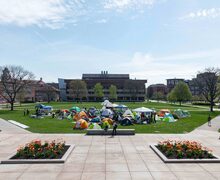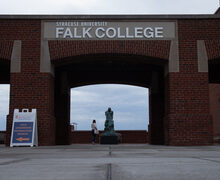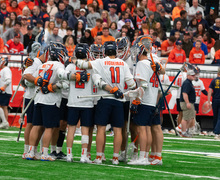Students from across the US return home, cancel plans due to coronavirus
Sarah Allam | Illustration Editor
There are now 194 cases of the virus in Onondaga County.
Enoch Lu planned to drive directly from Syracuse University to Washington, D.C. for spring break. He wouldn’t see any famous sites. He would stay indoors once he got there.
Lu, a senior international relations major, was hoping to visit his sister in the city. He and his family planned to remain inside as much as possible to avoid contact with others amid the coronavirus pandemic.
“Point A, being my house, to point B, being my sister’s house — I don’t think there’s a high chance of me getting the coronavirus that way,” Lu said before spring break. At that time, there were 22 cases of the novel coronavirus in the D.C. area, according to The Washington Post.
The city has now confirmed 401 cases, and Lu has since canceled his plans to visit his family. He didn’t want to risk contracting the illness.
The novel coronavirus causes COVID-19, a respiratory disease that has infected more than 143,500 people and killed more than 2,500 in the U.S. SU students from across the country told The Daily Orange that the virus has changed their hometowns, and that they’re concerned for the people in their communities as the pandemic continues.
Lujane Juburi, a sophomore from Alexandria, Virginia majoring in policy studies and philosophy, is used to the vibrancy and excitement of Washington, D.C. It was strange to return home after the virus reached her city, she said.
“There are a lot less people in the streets and driving, and it’s very quiet,” Juburi said. “It’s not the same D.C. that I left.”
Patomac, Maryland feels like a ghost town, said Bryan Fletcher, a freshman majoring in newspaper and online journalism. There aren’t many people on the roads in the area, and it’s almost off-putting to know that nothing is happening outside because everyone is staying home, he said.
Valerie Solomon, a freshman psychology major who lives near Philadelphia, said she’s seen people outside in her community, but they strictly follow social distancing measures.
“I can see it in my neighborhood when my mom and I go for a walk. Everyone seems to notice when there are other people nearby and either you move off the sidewalk or they do,” she said.
SU announced March 13 that all classes would be held online until at least March 30. At the time, there were no confirmed cases of the virus in Onondaga County. Many students were leaving the university for spring break and returning home to areas with confirmed cases.
Lu said he was worried about taking a flight back to his home in Benicia, California. His home is about 30 miles from Contra Costa County, California, which has 175 confirmed cases, and about 50 miles from Sacramento County, which has 164 confirmed cases. He decided to stay in his off-campus home in Syracuse until the risk of infection calms down.
“It’s only a matter of time before it spreads to the rest of the areas that aren’t greatly impacted yet,” Lu said. “My parents there are safe, but I hope people can delay how fast the virus spreads.”
There are now 194 cases of the virus in Onondaga County, and SU has moved all classes online for the remainder of the semester.
Jacy Cola, a sophomore broadcast and digital journalism and psychology dual major, planned to stay with his grandparents in New York City during spring break. After SU announced it would transition to online courses, Cola decided to travel back home to San Antonio, Texas.
San Antonio and Bexar County, Texas, have at least 157 confirmed cases of COVID-19. Cola is concerned about his sister, who has rheumatoid arthritis and a suppressed immune system. His family is trying to stay calm and keep a normal routine, he said.
“My grandparents are super cautious. But they’re still going down to the local bakery, down to the local grocery store,” Cola said.
Ian McHugh, a sophomore bioengineering major, lives in Warwick, Rhode Island, where almost 300 cases of COVID-19 have been reported. Sixty miles away, in Boston, there have been 735 confirmed cases.
“There are definitely a lot of people who travel from towns around us to Boston, and then obviously that will just trickle down,” McHugh said. “I’m sure our area is in a high-risk state. I feel like most of the country is in a similar position because of the major cities.”
Cities and counties across the country have enacted strict social distancing measures to prevent the spread of the virus, including closing small businesses and canceling large gatherings.
Most businesses and restaurants in freshman Emma Caplan’s Philadelphia suburb have closed down, she said. Pennsylvania ordered a closure of all non-life-sustaining businesses on March 19 to keep the virus from spreading.
“It’s definitely affecting those businesses very hard,” said Caplan, an art video major. “Lots of my friends’ parents have been laid off or for the time being are not getting a paycheck.”
While a lot of small businesses are closed, Solomon said she’s seen places find different ways to stay connected to clients, such as through offering deliveries and take-out services. Local boutiques are providing appointments on FaceTime and allowing clients to purchase products through Venmo, she said.
Though the outbreak is a global issue, there may be a lot of positive moments that come about during this time, said Kellen Reiche, a freshman television, radio and film major from the Philadelphia area.
People in his community are spending time both outdoors and with their families, Reiche said. He’s started taking walks around his neighborhood with his parents, and enjoys seeing his neighbors doing the same.
Some students also said they’re unsure whether their city will implement lockdowns. The Centers for Disease Control and Prevention issued a travel advisory Saturday urging residents in New York, New Jersey and Connecticut to refrain from nonessential travel for two weeks.
“There are a lot of questions, like what will happen if there is a shut down,” Juburi said. “What will that shut down look like? What do we need to do to prepare for that?”
Juburi’s mother works as a medical interpreter and frequently goes to Johns Hopkins University’s campus in Baltimore, Maryland. Hearing her mom’s experiences with patients who have contracted COVID-19 has helped her understand the perspectives of those the virus has directly affected, she said.
“It makes me more aware and cognizant of how close we are to people being affected,” Juburi said. “You can see what’s happening in the hospital on the inside.”
Many students said they are also concerned for people in their area who are at risk of contracting the virus. Fletcher said he’s more concerned for others’ wellbeing than for himself.
“You really have to think about the community you’re around and the people who are at risk within that community,” he said.
Published on March 30, 2020 at 11:14 am
Contact Sarah: [email protected] | @sarahalessan




